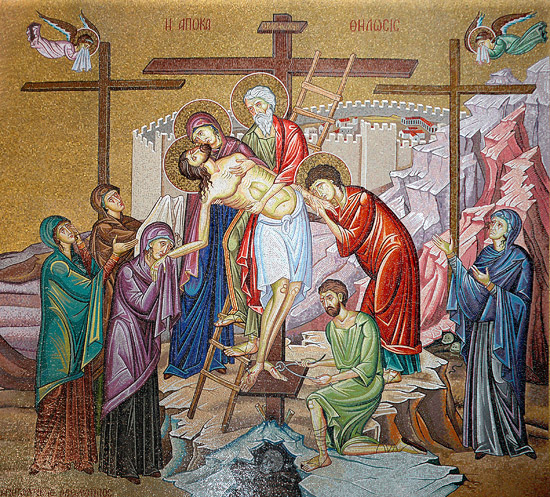 Taking the Savior down from the cross. Church of the Resurrection in Jerusalem. Photo: Anton Pospelov/Pravoslavie.ru
Taking the Savior down from the cross. Church of the Resurrection in Jerusalem. Photo: Anton Pospelov/Pravoslavie.ru
Yet, as during the first creation of the world God created all creation in six days and on the sixth day he created the final and entirely perfect creature, Man, and then on the seventh he rested from all His work, thus sanctifying this day, calling it the Sabbath Day, which means rest. Thus He sanctified the workmanship of the intelligible world, all wonderfully done (the action of redemption), and on the sixth day (Friday) "refashioning" the corrupted man and renewing him through His life-bearing Cross and death. The Lord really rested again on the seventh day with the complete rest from His works, having reposed in a way that is life-producing and saving for our nature. Therefore God the Word descended into the tomb in the flesh and descended into Hades with His immortal and divine soul, which was separated from the body after death. He delivered His soul into the hands of the Father. He freely offered His own blood in order to bring about our deliverance.
But the soul of the Lord was not held captive in Hades as were the souls of the other holy ones. Why? Because He never participated in the curse of the Forefather as those did. Our enemy the devil did not even touch the blood by which we are redeemed even though he owned us as much as he could, and did not the devil like a predator seize the One sent from God, but God Himself? However, our Lord Jesus Christ was bodily placed in the tomb with His Divinity which was completely united with the flesh, but He was also in paradise with the thief and, as it is told, in Hades with His deifying soul, supernaturally co-presiding with the Father and the Holy Spirit, He was everywhere as the uncircumscribed God, and the Divinity did not suffer at all neither in the tomb nor on the cross. The Lord's body was tested and the corruption, i.e. the separation of the soul from the body, did not destroy the flesh and corrode its members.
In Thy ineffable condescension, O Christ our God, have mercy on us. Amen.
Hymns from the Services of Holy Saturday
Joseph with Nicodemus took Thee down from the Tree, who deckest Thyself with light as with a garment; and looking upon Thee dead, stripped, and without burial, in his grief and tender compassion he lamented, saying: “Woe is me, my sweetest Jesus! When but a little while ago the sun saw Thee hanging on the Cross, it wrapped itself in darkness: the earth quaked with fear and the veil of the temple was rent in twain. And now I see Thee for my sake submitting of Thine own will to death. How shall I bury Thee, my God? How shall I wrap Thee in a winding sheet? How shall I touch Thy most pure body with my hands? What song at Thy departure shall I sing to Thee, O compassionate Saviou? I magnify Thy sufferings; I sing the praises of Thy burial and Thy Resurrection, crying: O Lord, glory to Thee”.
Sticheron from Friday Vespers
Noble Joseph, taking down Thy most pure body from the Tree, wrapped it in clean linen with sweet spices, and he laid it in a new tomb.
Going down to death, O Life immortal, Thou hast slain hell with the dazzling light of Thy divinity. And When Thou has raised up the dead from their dwelling place beneath the earth, all the powers of heaven cried aloud: “Giver of Life, O Christ our God, glory to Thee.”
The Angel stood by the tomb, and to the women bearing spices he cried aloud: “Myrrh is fitting for the dead, but Christ has shown Himself a stranger to corruption.
Troparia (Tone 2)


